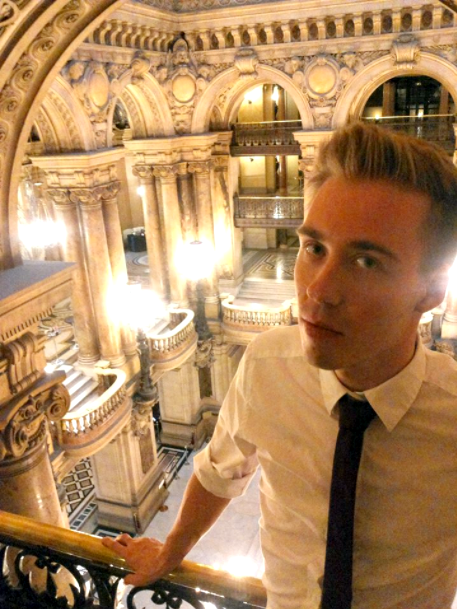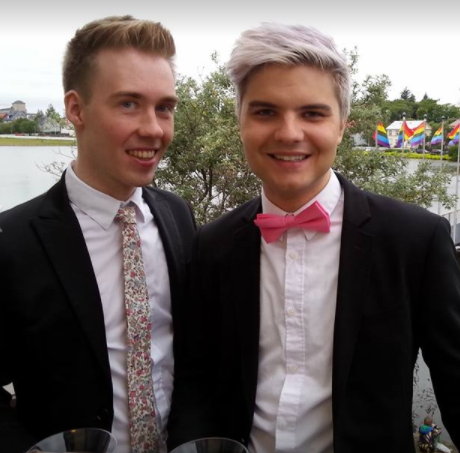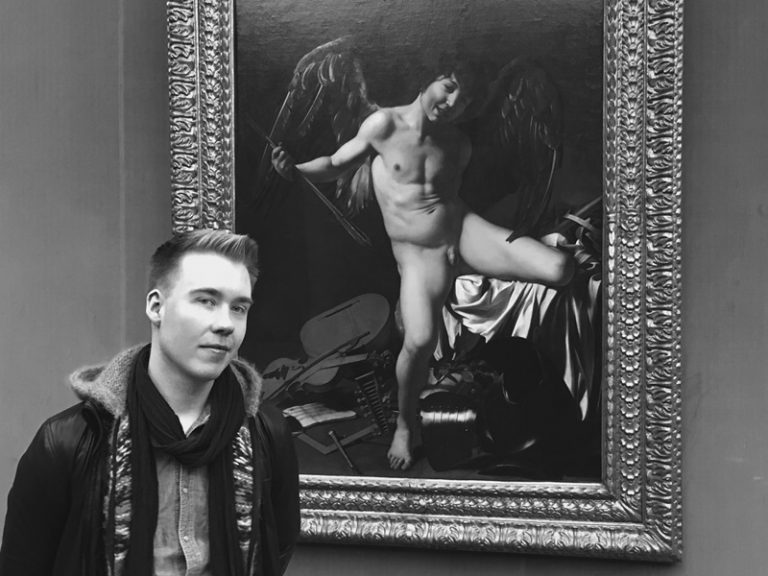The official song of Reykjavík Pride this year, “Colors of the Rainbow” (Litir regnbogans) is composed by Örlygur Smári, of Eurovision fame, as well as Michael James Down and Primoz Poglajen but the lyrics are by a complete novice, Hólmar Hólm, who admits that he has never written lyrics to a song before, even though he has written poetry for years.
To top it off Hólmar’s partner, Daníel Arnarsson, the newly appointed executive director for Samtökin ’78, sings the song, so in a way you could say that the lyrics are an expression of personal love as well as a celebration of the endurance of love above all things.
GayIceland asked Hólmar about his involvement in the project. Our first question was: How did you come to be a part of the team behind the song?

“For a long time, Daníel has been interested in tackling this project and has often spoken of his interest in working with Örlygur Smári. Ultimately, he got in touch with Örlygur and they started on their plans for the song. A little later, Daníel asked me if I might be interested in giving the lyrics a try. Being very flattered by the offer, I could hardly say no, even if I was a bit hesitant at first – that is, unsure that I would rise to the challenge.”
Have you written lyrics before?
“No, actually this is the first time I have written lyrics for a pop song, or any piece of music for that matter. However, I have written a bit for my own enjoyment, both poems and prose, as well as writing and translating somewhat, as a part of my studies or other projects. Indeed, what I enjoy most is writing, playing with words and meaning, symbols and stories, and I drew mostly on that experience for this project, which I approached in pretty much the same way I write poetry.”
Did you find writing the lyrics to a song by a renowned songwriter intimidating?
“You could surely say that it was a bit intimidating, not to mention the task of writing lyrics for such an auspicious occasion – an event which is near and dear to my heart – but mostly I enjoyed the process and getting to try something different. Moreover, I am very honored to have gotten the chance to take part in this – with a songwriter I have admired for years, to top it all, as a longtime fan of the Eurovision Song Contest!”
What is the message or meaning behind the song?
“Love has and will always prevail, even in the darkest abyss – chaos itself. In that way, the ancient philosopher Parmenides mentioned Eros, that is Love, as the first of all things to come into being, but he also said that nothing came from nothing, meaning that everything that is, has always been, to keep it short. Here I choose to twist his metaphysical wonderings into an account of the eternal nature of love, employing a bit of poetic license in the process.
“I am very honored to have gotten the chance to take part in this – with a songwriter I have admired for years, to top it all, as a longtime fan of the Eurovision Song Contest!”
The poet Hesiod also mentioned Eros as one of the primordial gods in his Theogony, an account of the creation of the world. Later Eros became the very god whom we know best as Amor, but there were usually many different accounts of the origins of the gods in existence, allowing me to take advantage of the ambiguity of the sources.
Aphrodite and Iris, the goddesses of love and the rainbow respectively, join the party as well. Iris was also the messenger of the gods. As such, she connected the worlds of gods and men, heaven and earth, and the rainbow became a symbol of the bridge between these two worlds (a motif which we recognize in Norse mythology). On the edge of the worlds of gods and men there were also many supernatural and magical creatures, often the offspring of gods and men, who somehow clashed with the norm. One might say these creatures were different or queer! That is why I praise the power of love and diversity, both of which know no boundaries.”

Your partner sings the song. Did you keep him in mind when writing the lyrics or did he influence you in other ways?
“Well, I wrote the lyrics for him to sing, so I guess you could say that the song is dedicated to him in a way, but above all the song is dedicated to the whole spectrum of queer people. Daníel has certainly often had to endure listening to me talk about all kinds of things connected to classical studies before, but I discussed the lyrics with him during different stages of the process, from the first concept till the end, as a way of helping me put my thoughts into words. Without that, the end result would not have been the same.”
Other than that, what were your main influences or inspiration?
“I have been enchanted by the Greek myths ever since I was a child and growing up I have dedicated much of my time to classical studies. Because of this, I tend to view things through that lens and often look there for inspiration. To be sure, the tradition, which I rely on now, of dedicating songs and poems to the gods is many thousands of years old and still breathing life, even through a pop song like this. This time in particular, I looked to ancient poets and philosophers like Hesiod, Homer, Parmenides, Catullus, as well as Icelandic poets and translators, like Sveinbjörn Egilsson and Helgi Hálfdánarson.
“Well, I wrote the lyrics for him to sing, so I guess you could say that the song is dedicated to him in a way, but above all the song is dedicated to the whole spectrum of queer people.”
More current influences might be Eurovision contestants, like Francesco Gabbani, who competed for Italy this year, and Amir, who participated for France last year, popstars, like Páll Óskar, Lady Gaga and Madonna and even Disney animated features, like Hercules and Pocahontas. My fellow performers in Drag-Súgur, kings and queens, who possess immeasurable beauty, courage and grace, are also a constant source of inspiration to me. In some way, these different things all had some influence on the final outcome, however big or small it might be.”
Can we expect to see you, Daníel and Örlygur team up again in the future?
“This project was entirely unexpected, but an unexpected pleasure at that, to say the least. I would absolutely be willing to give something like this another try in the future, as nothing is set in stone. I am just going to enjoy this for now and take it from there. In any case, I will say that Reykjavík Pride is an excellent start, from my point of view – and even if it ends there. What could be gayer or more fun, than that!”
A video for the new Pride Song (made by Hólmar Hólm):


